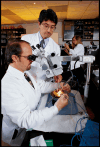Notable Programs in Neurotology Series: The University of Miami Ear Institute
- PMID: 39734417
- PMCID: PMC11671097
- DOI: 10.1097/ONO.0000000000000063
Notable Programs in Neurotology Series: The University of Miami Ear Institute
Abstract
The University of Miami Ear Institute (UMEI) was conceived and founded by Dr. W. Jarrard (Jerry) Goodwin in 1990, then Chairman of the University of Miami Department of Otolaryngology-Head and Neck Surgery. Dr. Goodwin's goal was to establish a state-of-the-art institution featuring world-renowned experts in otology, audiology, cochlear implants, balance disorders, skull base surgery, and research. With the support of many within and outside the University, he succeeded in this endeavor and appointed Thomas J. Balkany the first director of the Ear Institute. Under Dr. Balkany's leadership, the institute continued to evolve alongside the growing University of Miami Department of Otolaryngology, pioneering developments in pediatric cochlear implant surgery and postoperative care and basic science research. Dr. Balkany transitioned from UMEI Director in 2010, succeeded by Dr. Fred F. Telischi, and subsequently Dr. Simon I. Angeli who is the current Ear Institute Director. The Ear Institute experienced exponential growth in clinical services, research, education, and advocacy throughout the 2nd decade of the 21st century. Renamed the UHealth Ear Institute, its organizational structure evolved to meet new challenges. In its 34-year history, the UHealth Ear Institute has transformed from an idea into a nationally and internationally recognized center of excellence. It remains dedicated to advocating for universal hearing health, ensuring access to hearing health services, providing exceptional patient care, advancing innovative research, and training future specialists.
Keywords: History of otology; Neurotology; Otology.
Copyright © 2024 The Authors. Published by Wolters Kluwer Health, Inc. on behalf of Otology & Neurotology, Inc.
Conflict of interest statement
The authors have no conflict of interest to disclose.
Figures


Similar articles
-
[80 years' of internal medicine education at the medical school of the university in Belgrade (1922-2002)].Srp Arh Celok Lek. 2003 Jul-Aug;131(7-8):351-64. Srp Arh Celok Lek. 2003. PMID: 14692153 Serbian.
-
Abass Alavi: A giant in Nuclear Medicine turns 80 and is still going strong!Hell J Nucl Med. 2018 Jan-Apr;21(1):85-87. doi: 10.1967/s002449910713. Epub 2018 Mar 20. Hell J Nucl Med. 2018. PMID: 29550853
-
From the History of the Croatian Dermatovenereological Society - The Croatian Medical Association and an Overview of Important Information Regarding the Journal Acta Dermatovenerologica Croatica.Acta Dermatovenerol Croat. 2018 Dec;26(4):344-348. Acta Dermatovenerol Croat. 2018. PMID: 30665489
-
[Development of food and nutrition sciences in the 100-year history of the National Institute of Hygiene in Poland].Przegl Epidemiol. 2018;72(4):537-547. doi: 10.32394/pe.72.4.31. Przegl Epidemiol. 2018. PMID: 30810011 Review. Polish.
-
Current trends and applications in endoscopy for otology and neurotology.World J Otorhinolaryngol Head Neck Surg. 2021 Feb 6;7(2):101-108. doi: 10.1016/j.wjorl.2020.09.003. eCollection 2021 Apr. World J Otorhinolaryngol Head Neck Surg. 2021. PMID: 33997719 Free PMC article. Review.
References
-
- Balkany TJ, Hodges AV, Eshraghi AA, et al. . Cochlear implants in children–a review. Acta Otolaryngol. 2002;122:356–362. - PubMed
-
- Eshraghi AA, Yang N, Balkany TJ. Comparative study of cochlear damage with three perimodiolar electrode designs. Laryngoscope. 2003;113:415–419. - PubMed
-
- Eshraghi AA, Dinh C, Bohorquez H, Angeli S, Abi-Hachem R, Van De Water TR. Local drug delivery to conserve hearing: mechanism of action of eluted dexamethasone within the cochlea. Cochlear Implants Int. 2011;1:S51–S53. - PubMed
LinkOut - more resources
Full Text Sources
